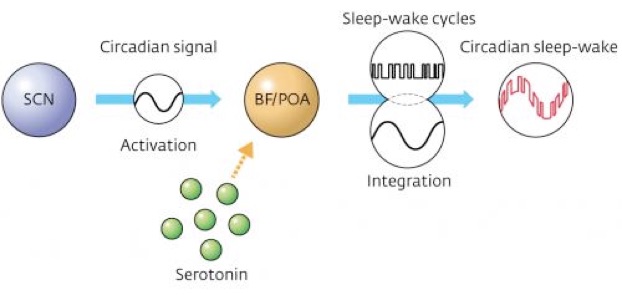Almost all animals have a hard-wired ‘body-clock’ that controls biological function in cycles of approximately 24 hours.
This is known as the circadian rhythm and, in mammals, it is controlled by signaling in a region of the brain called the suprachiasmatic nucleus (SCN).
The SCN regulates a number of functions, including hormonal secretion, metabolism, brain activity and sleep.
Quality of Sleep Cycle

Serotonin links rhythmic activity in the basal forebrain and pre-optic area (BF/POA) to the circadian rhythm signalled by the suprachiasmatic nucleus (SCN), allowing sleep-wake cycles to be regulated over 24 hours.
Any reduction in the amount or quality of a sleep cycle may result in health problems. The normal sleep cycle consists of two difference kinds of sleep: REM (rapid eye movement or dreaming sleep) and non-REM (quiet sleep). Most people have approximately four to five cycles of REM and non-REM sleep per night.
Although the amount of sleep each person requires varies widely, the normal range usually falls between seven and nine hours per night.
Insomnia is the most common sleep complaint. Insomnia means taking a long time to fall asleep, waking up many times each night, or waking up too early and being unable to get back to sleep.
Note: Elevated cortisol at bedtime may be associated with insomnia.
Physical Repair and Regeneration
During sleep regulation
- 10pm-2am physical repair
- 2am-6am psychic regeneration
In a normal cortisol rhythm, the nighttime cortisol drops as a result of a decrease in ACTH stimulation. It is therefore ideal conditions, that one be in bed and asleep by 10pm. If these 3-4 hour windows of physical repair and psychic regeneration are compromised, a person may develop severe adrenal exhaustion.
Approximately three hours after dark, the output of ACTH from the pituitary decreases, allowing the cortisol to come down.
As cortisol drops, the pituitary will begin to release HGH (human growth hormone.) HGH transports amino acids from the blood to tissue for repair.
However, if cortisol remains elevated, not only will HGH not be released in sufficient amounts, but cells will break down and release amino acids back into the blood stream, resulting in a catabolic state.
How to Improve Sleep
- Avoid before-bed snacks, particularly grains and sugars.
- Sleep in complete darkness or as close as possible.
- No TV right before bed.
- Check your bedroom for electro-magnetic fields
- Avoid caffeine (no brainer).
- Avoid alcohol.
- Avoid medications that suppress melatonin
- Take a hot bath or shower before bed.
- Put your work away at least one or more hours before bed.
- Get more sunlight throughout the day.
- Supplementation.
Melotonin
- Melatonin stimulates brain glutathione peroxidase activity
- Melatonin increases gene expression for antioxidant enzymes
- Melatonin may possess the ability to up-regulate the immunosuppression caused my stress.
- Melatonin improves cell function gated to an increased neuroprotective role for the sirtuin 1 pathway.
5-HTP
- 5-Hydroxytryptophan (5-HTP) is the intermediate metabolite of the essential amino acid L-tryptophan in the biosynthesis of serotonin.
- It easily crosses the blood-brain barrier and effectively increases CNS synthesis of serotonin.
- 5-HTP has been shown increase REM sleep from 5 to 53% of placebo baseline.
- 5-HTP has been shown to be effective in treating a wide variety of conditions, including depression, fibromyalgia, binge eating associated with obesity, chronic headaches, and insomnia.
GABA
- GABA(A) receptors plays a crucial role in the initiation and maintenance of NREM sleep
(See more information under neurotransmitters)
